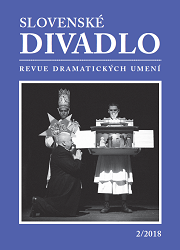Rok 1948: Emancipácia žien a slovenské divadlo. Príspevok k dejinám rodových vzťahov na Slovensku
YEAR 1948: EMANCIPATION OF WOMEN AND SLOVAK THEATRE. Contribution to the History of Gender Relations in Slovakia
Author(s): Nadežda LindovskáSubject(s): Theatre, Dance, Performing Arts, Gender Studies, WW II and following years (1940 - 1949)
Published by: Ústav divadelnej a filmovej vedy SAV
Keywords: emancipácia; Február 1948; slovenské divadlo; rodové vzťahy; Magda Husáková- Lokvencová; Ester Martinčeková-Šimerová; Katarína Hrabovská;
Summary/Abstract: From the cultural and art point of view, the year 1948 in Czechoslovakia was not just the so-called “Victorious February” of the working people. The remarkable phenomenon of this era, which was related to the post-war political and social movement, was the phenomenon of female emancipation and feminization of the stage production. During the two consecutive theatre seasons 1947/1948 and 1948/1949, at The New Scene Theatre of the National Theatre in Bratislava, several women, led by the director Magda Husaková-Lokvencová created several productions. For the first time, a sovereign feminine alliance had emerged in our performance art, proving that conceptual and thoughtful theatrical production may not be just the domain of men. These women contributed to deconstructing the beliefs of typically male and typically female professions as well as transforming traditional views of the role and position of both sexes in society and the arts. The attention of theatre historiography in the recapitalization of the impacts of the breakthrough events of the Czechoslovak post-war politics of the forty years on cultural events so far focused mainly on the issues of dramaturgy and poetics, the process of ideological transformation and the sovietisation of art in the spirit of socialist realism. The subject of socialist emancipation and theatre was at the edge of the interest of our theatrology. Ten years ago, a collective monograph, dedicated to the first lady of the Slovak theatre directors, Magda Husaková-Lokvencová, managing to free her forgotten personality and work and return her to the context of Slovak theatre history in the second half of the 20th century. There is still room for further research, complementing the knowledge and reflection of the advent of women in the sphere of theatre directory, dramaturgy and scenography artwork, as part of the history of gender relations in Slovakia. Increased interest in the history of women provokes a new reflection on the issue of emancipation and theatre.
Journal: Slovenské divadlo
- Issue Year: 66/2018
- Issue No: 02
- Page Range: 141-163
- Page Count: 23
- Language: Slovak

